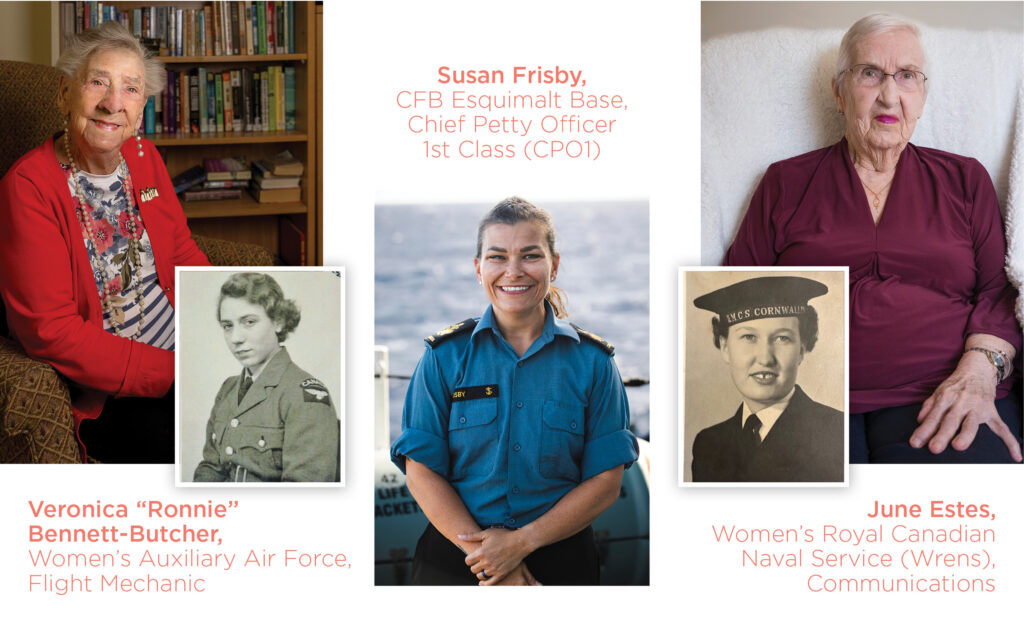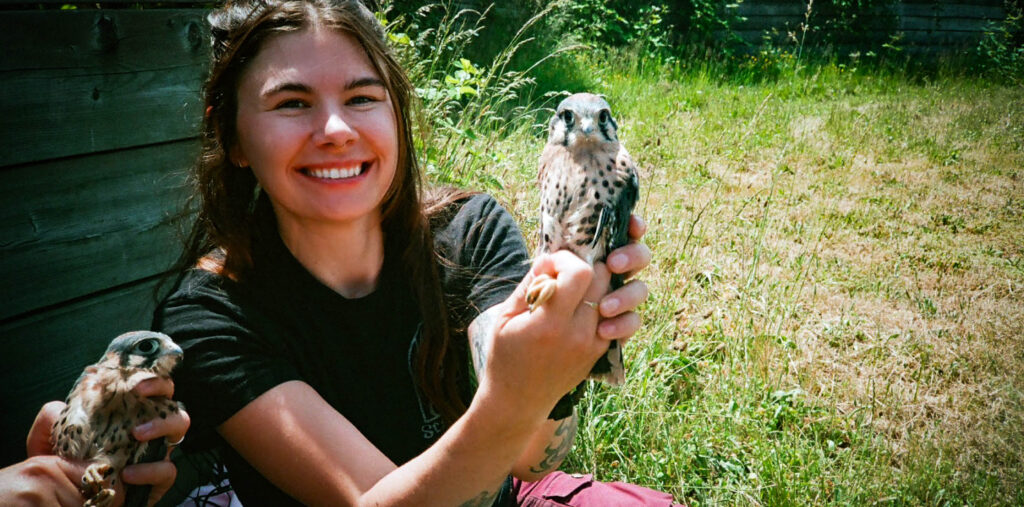by Jesse Holth –
Veronica “Ronnie” Bennett-Butcher, Women’s Auxiliary Air Force, Flight Mechanic
Ronnie is a self-described “small but mighty” 98-year-old who lives at Veterans Memorial Lodge in Broadmead. She signed up for service in WWII as soon as she could, at just 17 years old. “My father was in the Air Force and I wanted to serve too,” she explains. “I went to the training unit and was taught what to do by the instructors, then would send out to an aircraft unit and work on planes that were flying in combat.”
As a flight mechanic, Ronnie worked on aircraft engines – from changing the spark plugs, to making sure the engines worked properly, to installing them in the planes. She also had to do test flights in the planes she worked on, alongside the pilots, to make sure everything was functioning. “I had to fly in every plane I worked on – which could’ve been scary if I wasn’t a good mechanic!” Ronnie laughs.
One of her most cherished memories is when she finally realized her father was proud of her. It meant a lot, considering he had been against the idea of her enlisting. “We were having a visiting plane with some high-ranking officers come to our base and I had to meet the plane. I stood at the bottom of the step, and who should come off the plane but my father! I saluted and winked, and then I heard him whisper to the guy in front of him: ‘That was my daughter!'”
There were some frightening moments, too, during the war. “Of course, at that time, the bases were targets and the German planes would come over to bomb us.” But despite the challenges, it was worth it. “They were days I wouldn’t have missed for anything,” Ronnie says. “It was a hard life but very rewarding.”
Ronnie still remembers the day the war was over. “I was coming back from a date and the lights were on at the base, which was unusual because we’d had blackouts for six years. And then we heard Churchill shouting: ‘Peace has been declared! Peace has been declared!’ Everybody crowded into the Sergeant’s mess and started drinking – they even built a bonfire in the middle of the mess!”
After WWII, Ronnie remustered to drill instructor, where she got the nickname “The Dreaded Drill Instructor.” “I was pretty tough on them,” Ronnie laughs. “I had to be tough, because they would take advantage of me otherwise – everybody was taller than me! But my bark was worse than my bite,” she adds.
Photo by Leah Gray
Susan Frisby, CFB Esquimalt Base, Chief Petty Officer 1st Class (CPO1)
Susan grew up in Corner Brook, Newfoundland, where she enlisted at the age of 18. “I tried a semester of university and immediately discovered it was not for me,” she explains. Whether it was the long hours stuck in a classroom or the lack of adventure, Susan decided to join the Royal Canadian Navy as a Tactical Acoustic Sonar Operator. “I figured why not get paid to travel and see the world?”
In April 1998, Susan packed her bags and boarded a plane to Quebec for Basic Training. “Adventures, opportunities and experiences beyond my expectations filled the next 26-plus years of my life,” she says. “I joined young and have had the fortune of having many people throughout my career who have inspired, coached, mentored, and believed in me – including my family, who raised me to understand respect and compassion.”
According to her kids, one of the most interesting moments of her career happened as a Ship’s Team Diver. “I got to jump out of helicopters in the middle of the ocean and swim over the Mariana Trench,” says Susan. ” my entire career has been a memorable adventure.” Part of what makes it so special is the people, and having a team that supports each other through good times and bad. “Those moments in the middle of the ocean, thousands of miles away from home, are when we need our CAF family to show up. I have made friends who will always and forever be my Navy Family, without them I would not be who or where I am today.”
Susan lives her life by the philosophy that “one simple act of kindness can go a long, long way.”
Photo by Sailor 1st Class Melissa Gonzalez, Canadian Armed Forces Imagery
José Goold, Auxiliary Territorial Service, Driver
101-year-old José Goold was born in Erdington, England, and now lives at Veterans Memorial Lodge in Broadmead. She was 20 years old when she enlisted to serve with the Auxiliary Territorial Service in December 1942. Training as a driver, José was stationed in Beaumanor, Leicestershire, with the Royal Corps of Signals.
“I drove ambulances, 15-cwt troop carriers, staff cars, and various other military vehicles,” explains José. “They had these engines which we had to maintain ourselves – they were covered in oil, so our hands were always filthy.” She says the driving could be perilous, too, with traffic on the roads including large tank carriers.
One of her most important jobs was to drive intercepted Nazi messages from the “Y” Station to the now-famous Bletchley Park in Buckinghamshire, so they could be decoded. An English country house and estate, Bletchley Park was a top-secret location during WWII – it was the hub of Allied code-breaking and became vital to the war effort. “It shortened the war by two years,” adds José’s daughter, Johanna.
During these missions, José was responsible for transporting the messages along 70 miles of slow back roads. “There were no signposts,” José explains, “so you had to study your maps well.” She says there was always a soldier accompanying her for protection, a Redcap Military Policeman with a Sten gun. José could always be counted on to do her job. “We found her war records,” says José’s daughter Johanna. “Trustworthy, honest, and reliable. Those were the words they used to describe her.”
June Estes, Women’s Royal Canadian Naval Service (Wrens), Communications
June Estes and her husband Ron, who are both in their 90s, live together at Sidney All Care Residence. June had been working and living in Vancouver with her family when she joined up in 1951, around age 20, taking a train over to New Brunswick. She decided to follow in the footsteps of her older sister, May, who had been in the Wrens during WWII and was stationed in Halifax.
As a Wren, June worked in Communications. “We had special training in high school,” she explains. “In the Navy, you had to be able to talk to one another back and forth – you had to know Morse code in those days.” Most Wrens were stationed at Coverdale, and those who worked in Communications would copy Morse code messages, perform transcription, listen to dispatches, and intercept signals. During the Cold War era, they would listen for “spies” within Canada and intercept Morse code signals from Russian submarines and ships.
June met her soon-to-be-husband, Ron, who was also in the Navy, during her time as a Wren. “There was a naval radio station outside of Moncton,” says Ron, “and we were both in Communications. It was pretty much the day I met her, I said I wanted to marry her.” The following year, in January 1953, the couple were indeed married. “I made him wait for a little bit,” jokes June.
“It’s interesting how you run into different people at different times – how you manage to meet them or miss them,” says June. Ron continued to serve in the Navy for 37 years after that, while June left the Wrens to start a family. “It’s good times to look back on,” she adds.
Photo by Tanya Murchie




